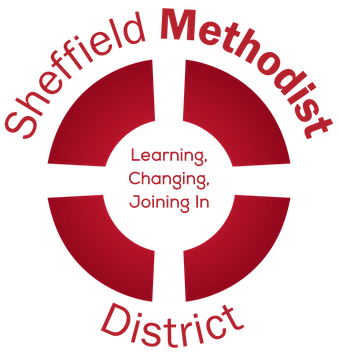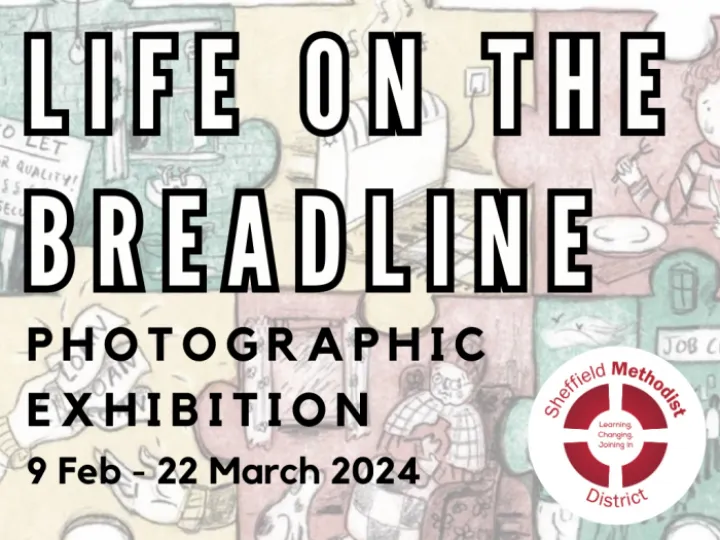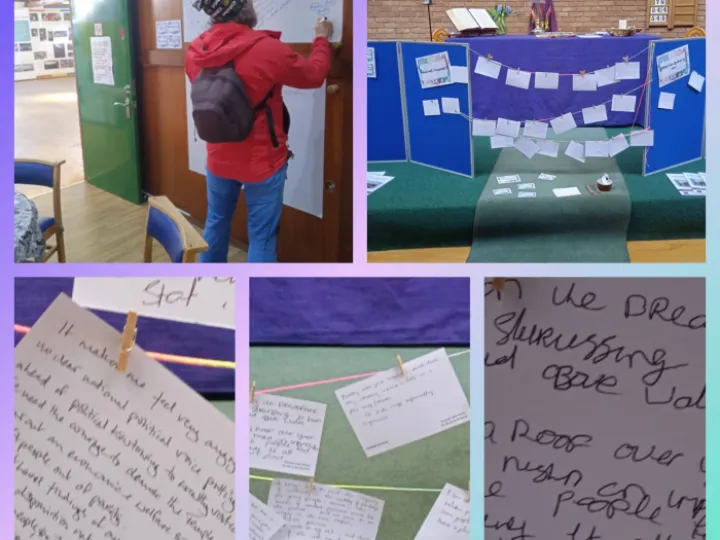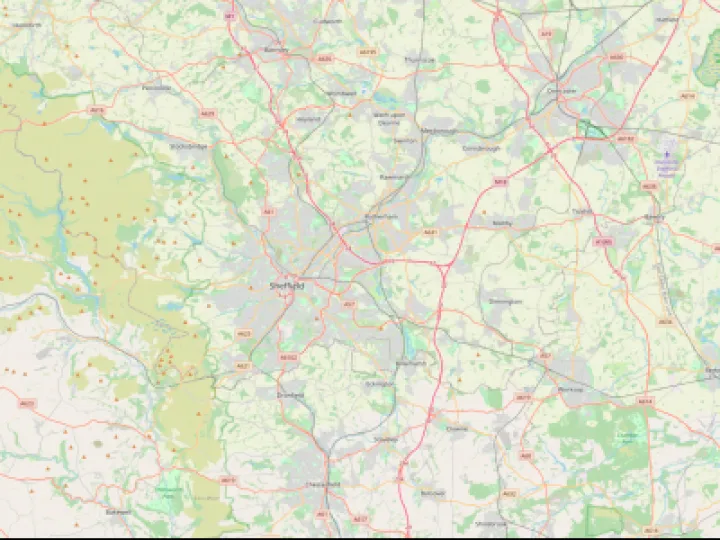Challenging Poverty – Life on the Breadline
Reflecting on "Life on the Breadline"
A personal reflection on the Life on the Breadline exhibition
from Richard Pinder, a member at Highfield Trinity Methodist Church, Sheffield Circuit.
David Price (Sheffield Church Action on Poverty) said of the Life on the Breadline Exhibition recently presented at Highfield Trinity and subsequently at Church of Christ in Darnall: "It is impressive to see the Methodists taking poverty seriously."
It is. And not only with respect to the Exhibition: there are many examples of local Methodists taking poverty very seriously.
I wonder though – not entirely cynically – if the staging of the Exhibition might also be seen as 'virtue-signalling'?
More constructively, I wonder if it might be possible to work to ensure that poverty is taken seriously by every church in the Sheffield Circuit and in all our circuits, by every local member of the Methodist Church, and thus by the circuits and district as an institutional whole? Rather than as the special interest of those local Methodists who run food banks, who identify as 'justice seekers', who work as volunteers in organisations that engage with issues of poverty . . . . . ?
Could taking poverty seriously become one of the defining marks of our circuits, driving all we do separately and together, re-shaping our culture, giving us a distinctive identity and profile, and driving us to challenge the accepted social order? Even requiring and enabling us to "cast our nets on the other side"?
How would we set about such a process of institutional change? We would start perhaps by recognising and working to dismantle the obstacles that get in the way of our engaging effectively with poverty. One such obstacle was identified at the Exhibition meeting held to explore the responses to poverty of different faith groups: the idea/belief that poverty is located in particular places and that if you are not there your engagement with poverty will necessarily be circumscribed.
This idea needs to be challenged, and is challenged by, amongst other agencies, the JustMoney Movement, which describes its work in these terms:
"The JustMoney Movement now focuses on the role of individuals and congregations across the UK churches, equipping them to think about how the money they use in their daily lives can become a tool to help live out their faith, through our Money Makes Change programme. We also equip Christians to speak out for changes in the tax system through our Church Action for Tax Justice campaign, and to call for banks and businesses to operate in ways that serve people and planet, rather than the other way around."
We can all engage with this – wherever we are!
A second obstacle that gets in the way of engaging with poverty is a professed distaste for politics, a sense that faith and politics do not and should not mix, that God wants us to be above the dirty business of politics. I find this extraordinary! How can one read the Hebrew Bible and believe that God wants their people to be above politics, when the people's politicking is at the heart of the whole history? As it is – though in a different way – at the heart of the New Testament of the Christian Bible, where through from the Gospel of Matthew to the Book of Revelation we see struggles over how social life should be organised, how resources should be divided, how justice and truth should be established: political struggles. The New Jerusalem anyone?!
More profoundly, if we are created in God's image then we human beings are for that reason intrinsically political beings: we develop values and seek ways of building societies founded on those values, we engage in cooperation and conflict with others to seek to ensure that our values prevail, we use the power invested in us by God to bring about the Good Society. If we are not political in this sense we have turned away from God – and God is missing us!
If we can remove those – and other – obstacles how might we engage with and act on poverty?
We might start by attending to and drawing on the wonderful, complex and disturbing tradition of Lament that we find most powerfully articulated in the Jewish Bible. A moving exhibition – also presented at Highfield Trinity, some time ago – of textile works by the Reverend Louise Carr weaves together the elements of Lament – weeping, chaos and confusion, protest, comfort, truth telling, desolation, emerging hope. Lament erupts as a scream of resistance, a refusal to accept things as they are, a rejection of the conventional and convenient (to some) view of poverty as a regrettable but inevitable dimension of the real world.
These days, when looking at television programmes on Gaza and shown poverty being ruthlessly constructed and imposed, we are told we will find some scenes 'distressing'. We must make our distress evident, privately and publicly. We must Lament!
We might also engage in 'anger management'. Conventionally this term is brought into play with respect to people with anger 'issues' and is about making anger less d-anger-ous. I have a different meaning in mind, one that is about bringing anger out, calling for anger where anger is missing or repressed or suppressed, and making anger not less but more dangerous – more dangerous for, amongst others, those who build and sustain and benefit from a world where poverty ruins the lives of millions. It was heartening therefore to read the words of a visitor to the Exhibition: "Anger is what I feel – Anger!"
As Christians, though, the anger we must nurture and deploy has a particular quality, a quality well signalled in one of Andrew Pratt's songs (253) in Singing the Faith:
4. {Love inspires the anger
that curses poverty,
preaches life's enrichment,
seeks equality.}
Where anger is not the outworking of love, the necessary expression of the love which defines our humanity, it will always become an exacerbating factor: serving to pull people further apart, to instil fear, to brutalise action, and to harden people's hearts. And that love must include not only those who suffer the impact of poverty but also those whose power generates and sustains poverty – however angry we might be at them.
More can be taken from Andrew Pratt's song:
5. {Love inspires the anger
that still can set us free
from the world's conventions,
bringing liberty.}
Amongst the 'world's conventions' are conventions relating to how we see, understand, engage with poverty, how we live with it. The overall message of those conventions is that there is really very little we can do about poverty (and actually it doesn't really matter all that much). I know! Of course, not everyone subscribes to these conventions, not everyone communicates this message. But note for example how the recent budget process has been framed: no money to spend on benefits or on the basics of life – housing, food, work – on which the poor miss out, and further deterioration in the public services on which the poor depend. (As of course do we all.) This is not a good time to be living life on the breadline.
We do indeed need to free ourselves from these conventions, in particular the one that says there is no money to reduce, let alone end, poverty. We need to assert that these conventions are in fact convenient lies, lies designed to make it possible to carry on doing little to nothing about poverty with a clear – or absent – conscience. And we need to start – carry on, to be more positive – creating and developing new conventions that affirm the necessity and possibility of ending poverty. We need to free our imaginations to show how it could be done and how society could and would as a result be different. (The ideas in this paragraph are discussed in more detail in an article written by Sam Gregory published in a recent issue (29th February) of NowThen.)
We must accept that it is our own responsibility to make these changes. But we should also accept that it is best for us to engage in this process not on our own but alongside others – including most potently people with 'lived experience' of poverty – whatever it is that drives them. Methodism has a long and respectable history of responding to poverty. And as David Price said: "It is impressive to see the Methodists taking poverty seriously." But even with an honourable tradition behind us we need allies: people of any faith, people of none, people who are pastoral, people who are prophetic; people who have been engaged in this work throughout their lives, people who perhaps recently have experienced an epiphany on poverty.
We are faced both with the challenge of getting our own house – our values, our skills, our priorities, our passions, our overall culture and the focus of our mission – in order; and with the challenge of finding, and finding ways of working with, others who share the view that poverty is a lamentable dimension of a rich society. How exciting that might be!
Richard Pinder
{14 March 2024
}
Quick Links
Registered Charity no. 1129363
Get In Touch
admin@sheffieldmethodist.org
0114 270 9990 / 0114 430 0255
Sheffield District Office
Room 47, Victoria Hall Methodist Church
Norfolk Street
Sheffield
S1 2JB



